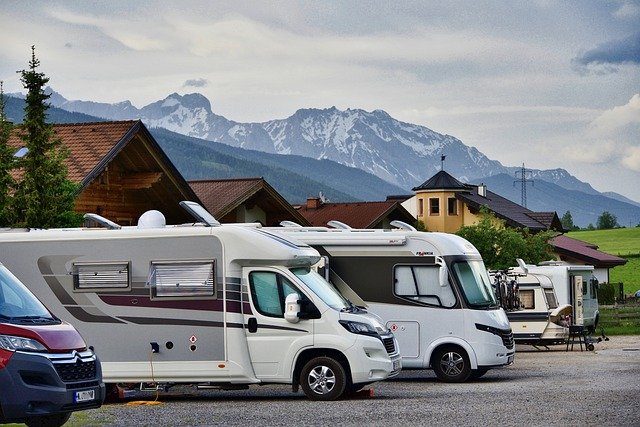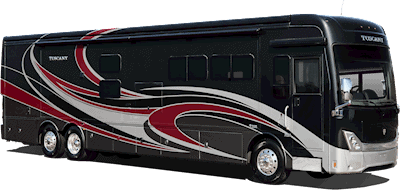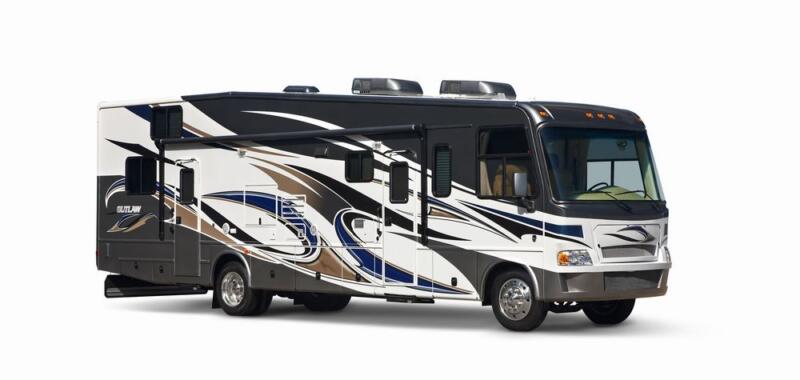Which is better: A diesel or gasoline RV motorhome?
(What came first: The chicken or the egg?)
The question itself is deceptive. What’s the measuring stick for “better?” Here’s the short n’ sweet answer:
- Diesel-powered RVs are better for RVers who log many miles.
- Gasoline-powered motorhomes are better for casual, fair-weather RVers.
- Diesel engines offer superior performance, fuel efficiency, and mechanical durability.
- On the other hand, gasoline engines are more affordable and easier to service.
If you’re shopping for a new or used RV, the question of what’s-better-gas-or-diesel is one of those thorny questions that can wreck forums, divide marriages, and leave you shellshocked with information overload.
I’ll try to chop through the dense thicket of online data. To make things simple, I’ll evaluate the two most common options:
- A “diesel pusher” (rear-mounted diesel engine)
- A “gasoline puller” (front-mounted gasoline engine)
Most diesel pushers are a Cummins/Allison/Freightliner combination. Most gasoline pullers have a Ford engine, chassis and transmission.
So the choices aren’t quite as infinite as they might seem.
I won’t be necessarily considering a FRont End Diesel (FRED) design or other “alternative” RV chassis designs. Let’s stick with the basics.

How to Decide: Gas or Diesel Motorhome?
One is not necessarily better than the other.
On paper, diesel usually comes out the winner for its oomph and efficiency. But in reality, many RV owners choose gas-powered RVs because “good enough is perfect!”
It really does come down to personal preference.
Here’s a simple process for making your own decision.
- Research the basics
- Compile a “Favorites” shortlist
- TAKE A TEST DRIVE!
- Read real owner’s experiences
What you’re doing now – reading this article – is a great start. In fact, I encourage you to bookmark (or print off) this article for reference while you’re shopping around!
I can’t emphasize Step #3 enough – take a test drive! Go up and down a big hill. Get up to 70 mph (safely, of course). Brake quickly. (For more advice, download this Motorhome Test Drive Checklist).
Oftentimes, it’s the road noise or suspension softness that makes your decision – not the engine type.
Please REMEMBER: Your chassis is only one component of your RV. The floorplan, “house” build quality, dealership service, and manufacturer customer support can be just as important. Your chassis combination is just one piece of the pie.
Pros and Cons of Diesel RVs

Pros
- Longer mechanical lifespan
- Shock-absorbing suspension
- Superior fuel efficiency
- Plusher interior features
- Longer service intervals
- Higher resale value
- More towing capacity
- High-speed stability
- More cargo capacity
Cons
- Expensive service and repair costs!
- Difficult to find qualified mechanics
- More costly fuel
- Higher upfront cost
- Fewer floorplan options
- Can be finicky in cold weather
Pros and Cons of Gasoline RVs

Pros
- More affordable!
- More floorplan options
- Affordable fuel, available anywhere
- Easy to find service, repair and parts
- Better “soft-road” accessibility
- More DIY-friendly
- Better for recreational RVers
Cons
- Shorter mechanical lifespan
- Noisy cabin from engine noise
- Less stable in winds
- Limited towing capacity (5000#)
- Less cargo capacity
- Poor fuel efficiency
Comparing Diesel & Gasoline RV Coaches
Let’s dive deeper into the pros and cons, advantages and disadvantages of gasoline versus diesel RV motorhomes.
Here are the categories I’ll be comparing:
- Upfront cost
- Resale cost
- Noise level
- Living space
- Maintenance
- Service
- Fuel economy
- Power
- Manueverability
- Stability
- Towing
- Cargo capacity
- Costs of ownership
Upfront Cost
Yup, diesel costs more.
How much more?
- For a big Class A, a diesel can cost $20,000-$40,000 more than a comparable gas-powered coach!
- For a moderate Class C, a diesel might cost $10,000-$20,000 more.
That’s not all because of engine differences, by the way. The RV industry knows that diesel coaches are typically sold to full-timers and serious RVers. So diesel coaches also often come with upgraded air suspensions, better braking, and other accouterments.
You’ll be hard-pressed to find a new diesel coach for less than $150,000, unless you’re looking at small diesel-powered vans, like Sprinter Class B’s.
To be frank, the lower upfront cost of gasoline engines is a major reason for their existence. On paper, diesel engines are better suited for big rigs.
But if you only plan to log 5,000 miles a year with your RV, then what do you care if your gasoline engine kicks the bucket at 120,000 miles? You’ll still get 20 years out of it!
Resale Cost
All other things being equal, a diesel RV retains its resale value far longer than a gas-powered RV. A diesel engine can easily last 300,000+ miles with proper maintenance. A gas-powered RV might only last 100,000 – 150,000.
(These are estimates, of course. Properly maintained, a Ford Triton engine can last well over 200,000 miles.)
Resale value example: If you’re selling a Class A coach with 80,000 miles, then with a gasoline engine, it’s 75 years old. But with a diesel engine? The coach is only in its late 20s!
However, resale value may not be important to you. If you buy and hold, then it doesn’t matter whether your RV has 80,000 or 140,000 miles on it – a 20-year-old RV will depreciate down to almost nothing, whether gas or diesel.
Noise Level
Front-mounted engines are loud. Like loud. Gas or diesel. Gasoline engines tend to be louder at high speeds or steep grades because they rev into higher rpms to access more power.
(Again, this is why test drives are so critical.)
Many gas-powered coaches also stash their onboard generator in the basement below the main sleeping area. Which means that when your generator kicks on at night, so do you.
Living Space
If your idea of an RV is a McMansion on triple axles, your only option might be a diesel.
Once your Class A (or Super C) coach gets longer than 36 or 38 feet, a diesel engine is usually the best choice. Most gasoline engines simply lack the torque to move something that weighs more than 26,000 pounds!
Conversely, if you want a smaller motorhome, gasoline might be your better option. Because of the sheer size of a diesel powertrain, diesel motorhomes shorter than 34 feet often have the rear axle placed too far forward, which can harm handling.
Maintenance
What you’ll commonly hear is that gas engines last 100,000-150,000 in an RV, and diesel engines can last at twice as long, 300,000 miles or more.
That’s … mostly true. Although the rest of the RV body commonly wears out before any engine will.
You’ll also hear that gas engines require 5k service intervals (e.g. oil changes, air filters) compared to a 15k service internal for diesel engines.
Again … mostly true. But the full answer is more complicated.
The diesels of 2002 are long gone. Federal emissions regulations, while certainly good for the environment, have significantly complicated modern diesel engines.
Modern low-emission diesel engines may have Exhaust Gas Recirculation (EGR) valves, Diesel Particulate Filters (DFP), Diesel Exhaust Fluid (DEF)*, high-pressure common rail injection systems, and other new-ish technology. They must use ultra-low sulfur fuel. The old claim that “diesel engines are simpler because they have fewer parts” just isn’t true anymore.
Talk to any commercial fleet owner, and they’ll tell you that the cost of diesel engine maintenance has skyrocketed. The engine itself is still mighty hard to kill. But the “clean diesel” exhaust system can be extremely expensive to maintain, repair, or replace.
For instance, just replacing the particulate filter on a 6.7 Cummins can cost up to $3,000!
So it’s no longer a given that diesel engines have a lower cost of ownership. The higher upfront price, more expensive fuel economy, and astronomical repair bills have leveled the playing field.
*DEF is available at Pilot, Flying J, Loves, and other service stations, plus auto part stores.
Service
Diesel fans, I have bad news for you.
Cummins and Allison (transmission) mechanics make a killing. If you thought getting your Honda or Ford serviced was expensive, you ain’t seen nothin’ yet!
Diesel mechanics are harder to find and more expensive to pay. RVers commonly complain about finding a qualified diesel mechanic while on the road, especially in the less populated American West.
Plus, gas engines are way more DIY-friendly. Diesel engines only make up about 3 percent of U.S. passenger vehicles. And familiarity breeds trust, as the saying goes.
Fuel Economy
Diesel engines achieve better fuel economy, as a rule.
Also, rear-mounted “pusher” engines have a shorter distance to the drive axles from the engine, resulting in less power loss.
Curious what fuel economy you can expect? Well, guess what – RV manufacturers don’t post MPG estimates! I tell you all about why RVs don’t share MPG ratings here (and share some of my own estimates). But as a rough guide, diesel engines get 20-40 percent better fuel economy.
A quick note on fuel economy: Since RV coaches are shaped like bricks, a little difference in MPH can have a huge impact on MPG. You can lose 15+ percent fuel efficiency just going from 55 to 65 mph!
Power
Diesel engines have that sweet, sweet torque low in the powerband. Once you’ve piloted a diesel Class A, a gas-powered coach feels like it’s driving through quicksand.
Diesel engines are also far better at maintaining highway speeds and accelerating up steep inclines, particularly in mountainous areas. You can often cruise up a 6 percent grade at 50 mph.
One caveat: Diesel engines don’t like the cold. The fuel can gel when the temperature dips to 10-15 degrees. Plus, diesel engines ignite the fuel using compression, and the air inside the combustion chamber should be at least 480 degrees.
Diesel engine engineers have invented many methods to combat this challenge. Your RV may have (or need) an engine block heater or intake air heater to help the engine in frigid conditions.
Unlike a gasoline engine, a diesel engine doesn’t “warm up” when idling. After the first 30 seconds or so, you can start driving in frigid weather – but try to stay beneath 2,000 RPMs for the first 5 minutes until the engine warms up.
Maneuverability
Ah-ha! Gas takes the lead!
If you frequent National Parks, boondocking sites, or hole-in-the-wall campgrounds, a classic diesel pusher might be too big. It’s hard to find a good diesel motorhome less than 34 feet or so.
If you’re looking for a small Class A or Class C motorhome, a gasoline engine might be a better choice. If it’s your first time driving an RV, here is a great place to start.
A smaller 26-ft Class C or miniature Class A, with small overhangs and good ground clearance, can get you into many primitive campsites inaccessible to “big rig” diesel pushers.
Stability
When I say “stability,” I’m referring to the ability of a motorhome to survive crosswinds and cornering without rolling or swerving.
In a large part, this is driven by the wheelbase ratio. A long RV with a short wheelbase is much, much less stable! RVCG has a classic article on why motorhome wheelbase is so important.
Unfortunately, many gas-powered Class A motorhomes have short wheelbases and long rear body overhangs, which reduces their stability. They are more prone to crosswind-induced sway and turnovers.
If you compare the Freightliner XC RV Chassis – one of the great workhorse “diesel pusher” RV chassis – to the Ford F-53 chassis – the de facto chassis for a Class A “gas puller” – you can see that most motorhomes built on the diesel XC chassis have a much larger wheelbase ratio than motorhomes built on the gas F-53 chassis. (52% is considered the safe minimum). This is one reason diesel Class A’s are renowned for better and safer handling.
Towing
As a rule, diesel-powered RVs can tow significantly more (some up to 15,000-20,000 pounds!). About 10,000 pounds is average.
“Gasser” motorhomes can typically tow about 5,000 lbs, or the weight of a small-to-medium passenger vehicle.
If you plan to tow a vehicle as a “toad,” you should seriously consider a diesel-powered coach. Anything bigger than a Honda Civic will possibly overtax the capabilities of a gas RV motorhome, especially on mountain passes.
Cargo Capacity
As I’ve ranted about before, RVs are commonly built with woefully inadequate cargo capacity. Class A and Class C motorhomes are no exception. In fact, they can be some of the worst offenders!
Diesel pushers are commonly designed with full-time RVers in mind. They’re designed to haul some serious cargo. If you’re looking for a Class A Toy hauler, you’re almost certainly going to need a diesel engine.
Total Cost of Ownership
Guys, I’m telling you, you can drive yourself crazy trying to calculate “total ownership costs” of gasoline versus diesel RVs. There’s resale value … purchase price … financing interest … fuel cost … routine maintenance … common repairs … insurance premiums …
Lucky for us, this post isn’t going to turn into an algebra lesson. Here’s the 411:
- Mile for mile, diesel wins! The increased fuel economy more than offsets the extra fuel cost and DEF fluid cost.
- But dollar for dollar, gas wins! Because you’d have to drive a diesel for hundreds of thousands of miles to recoup the upfront cost.
- … Well, maybe I spoke too soon. If you drive both motorhomes the same distance, this advice holds true. But if you drive your diesel pusher 310,000 miles – well, would your Triton V10 engine even last that long?
At the end of the day, there isn’t a clear financial winner between the two. The more miles you drive, the more diesel makes sense. But for many RVers, total cost of ownership (TCO) between gas and diesel coaches might just be a toss-up!
Let’s take a minute, breathe, and step back. What’s most important here?
Many people want to know whether a gasoline or diesel engine is more cost-effective. As you now (hopefully) understand, for RVers that average 5,000-10,000 miles a year, there might be no difference!
If your focus is saving a few grand on total costs of ownership, then I humbly suggest shifting your priorities.
Don’t pick a diesel Class A because “it’s better” and spend an extra $40,000 on a coach you don’t drive more than 4,000 miles a year between Nebraska and Arizona.
Or don’t pick a gasoline engine because “it’s better” and then hate every moment crawling up mountain passes at 35 mph while wearing noise-canceling headphones.
Is knowing that you saved 6 cents a mile really going to make you feel better? Buy the best RV for you. Take the test drive!
Leave a Reply